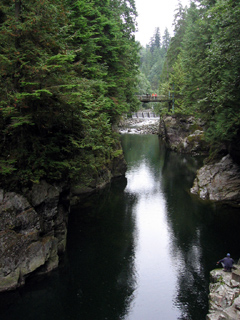Catching up on the reading that accumulated in my absence, I have just gone through the Survey on Climate Change in the September 9-15 issue of The Economist. Their basic argument is that the possibility of catastrophic harm is sufficient to justify the costs of stabilizing the level of carbon in the atmosphere around 550 parts per million, compared with 280 ppm before the industrial revolution, 380 ppm now, and an estimated 800 ppm by 2100 is current policy goes unchanged. The most plausible dangers identified are disastrous shifts in ocean currents, dramatically cooling Europe, and the prospect of rising sea levels. Even modest amounts of the second could do enormous harm both in the coastal cities of the developed world and the lowlands of places like Bangladesh. Other problems include the possibility of an increase in the frequency and severity of extreme weather events, and large scale species migration or extinction.
Canada is singled out several times as unlikely to meet its Kyoto targets. We are committed to reduce emissions to 6% below 1990 levels by 2012, but seem likely to be 23% above. The survey quotes Environment Minister Rona Ambrose as saying: “it is impossible, impossible for Canada to reach its Kyoto targets.” The Economist had not previously been a supporter of Kyoto, though they surely support countries living up to commitments they have made. With this survey, the magazine seems to have changed tack from general opposition to the Kyoto Protocol to recognition that it may be a valid stepping stone towards a better organized and more all-encompassing climate change policy.
At the very least, the editorial change of heart signals strongly that climate change is no longer an issue whose reality is disputed, not suited to serious consideration by scientists, policy-makers, and the media. With my thesis in mind, it is largely the first group that I paid most attention to while reading this. At several points, the article asserts that it is at the 550ppm level that scientists in aggregate start to become seriously concerned about adverse and irreversible problems associated with climate change. That said, the survey also highlights a number of scientific disagreements and failed predictions. The interplay between science and politics is basically portrayed as a simple relationship between two internally complex dialogs. That is a model I certainly mean to unpack further in my thesis work.
As I didn’t actually manage to go see An Inconvenient Truth at the Phoenix yesterday, I am making another foray tonight for the 7:00pm show.


